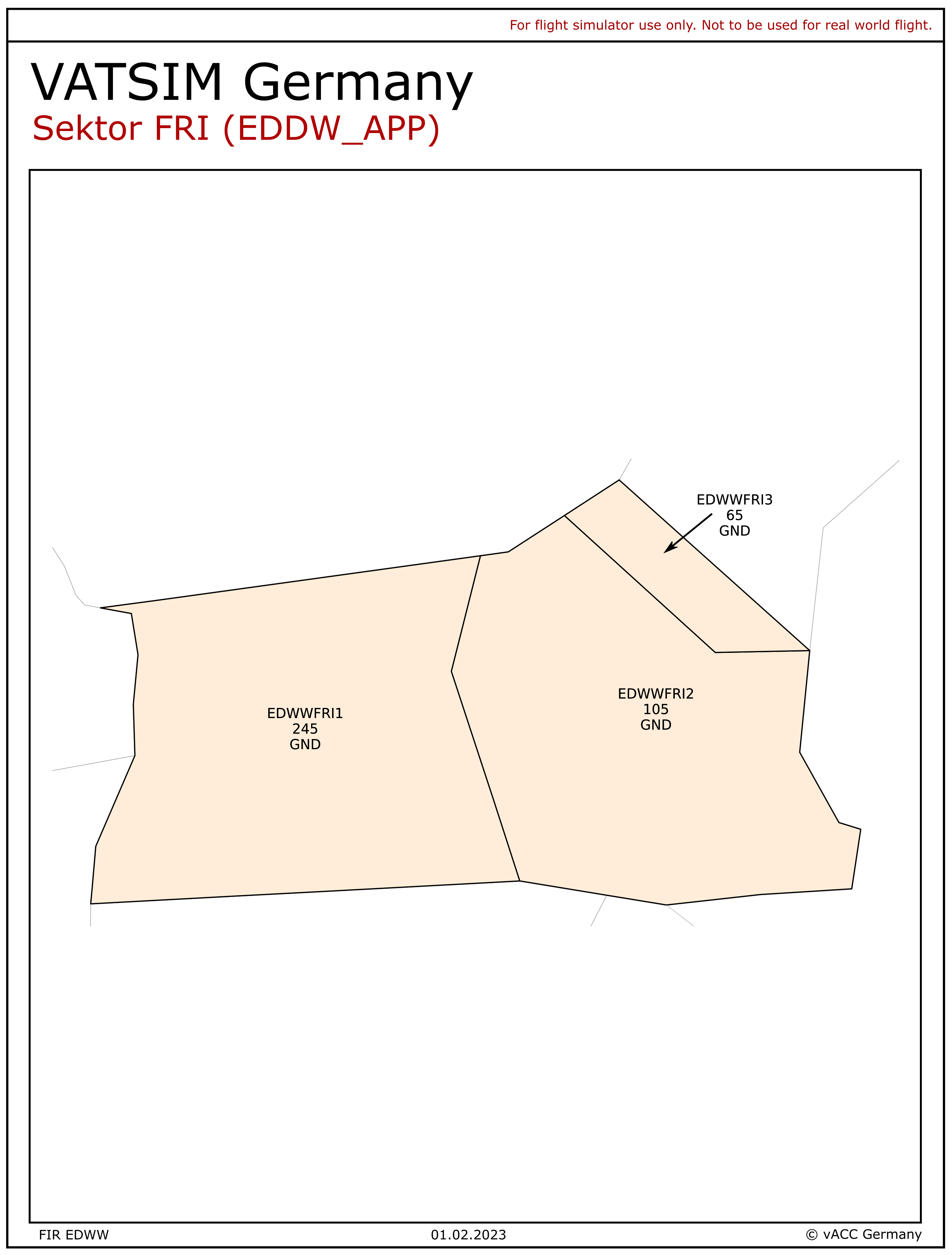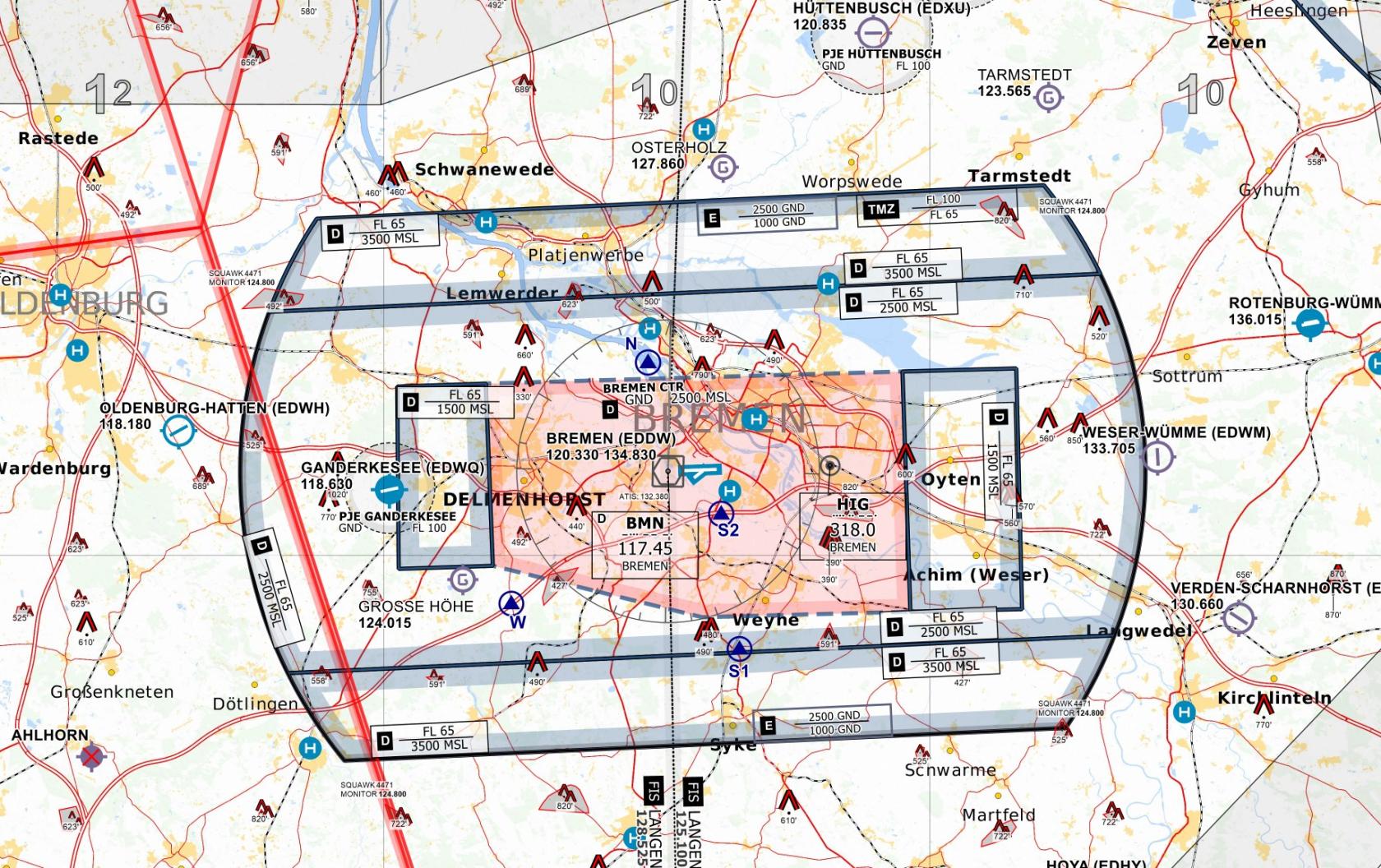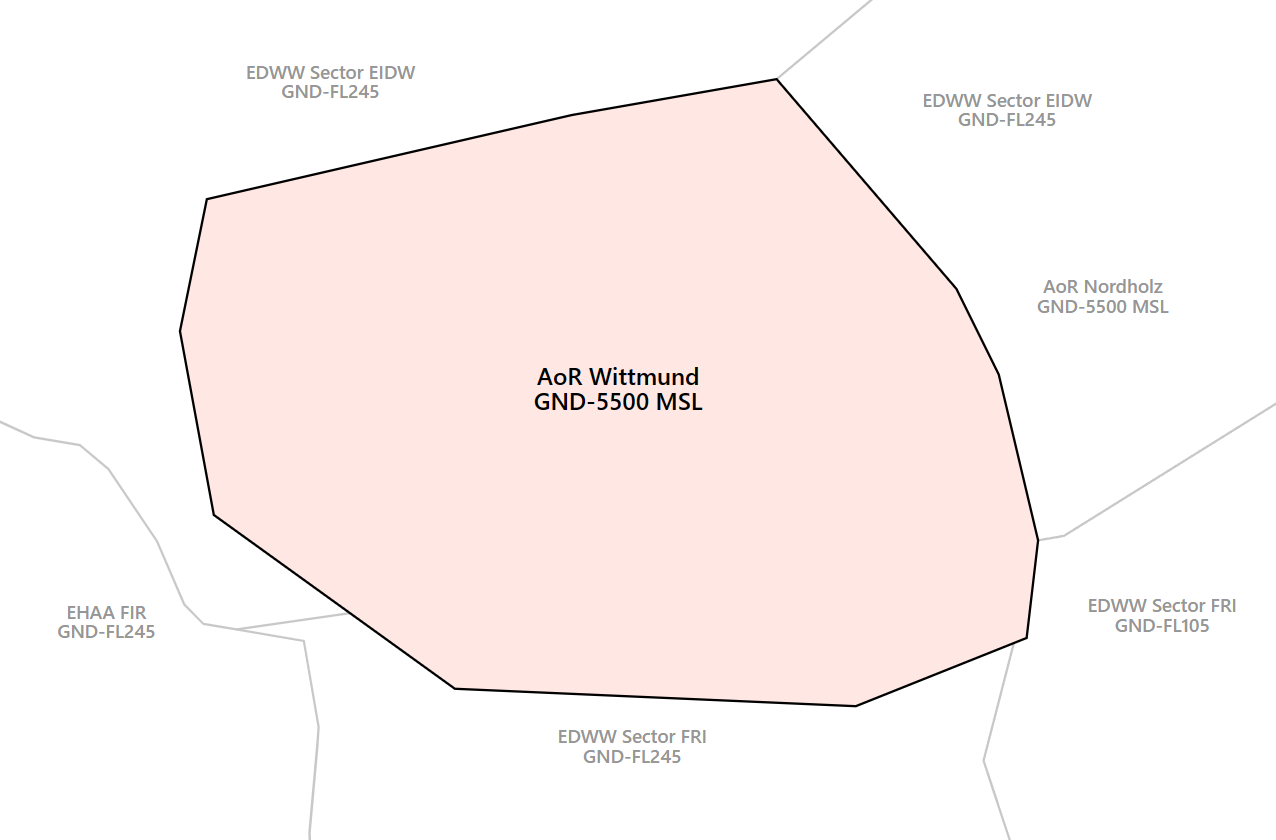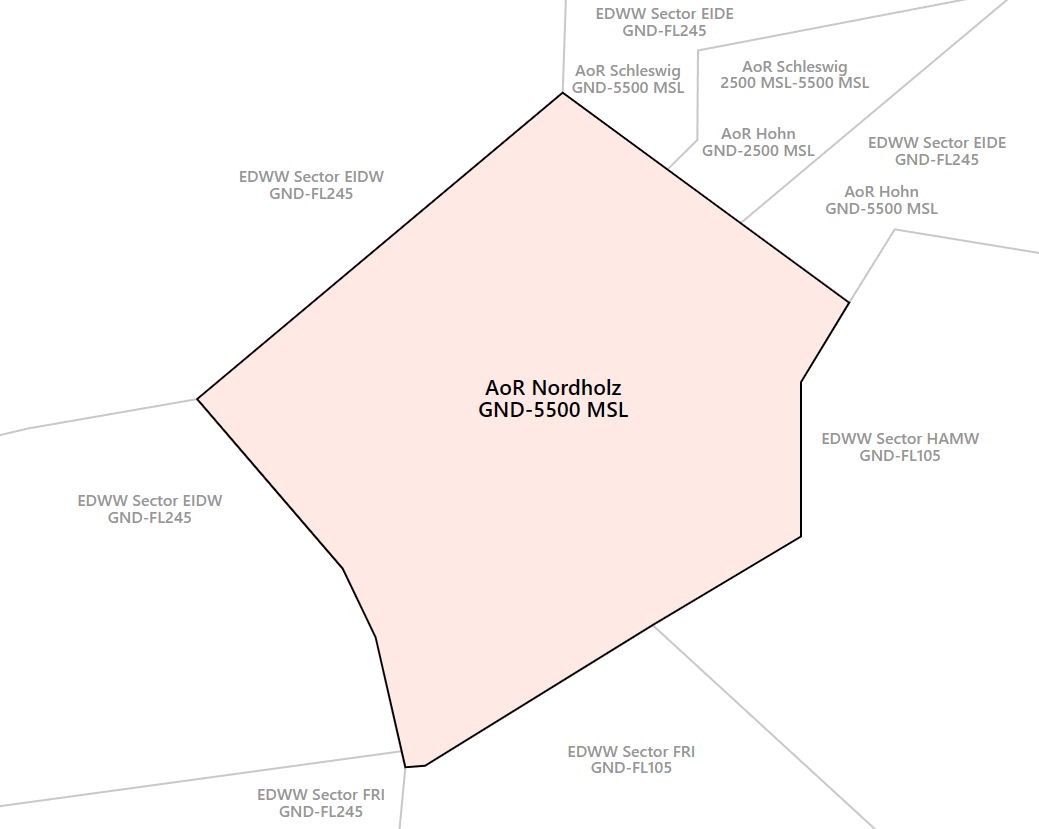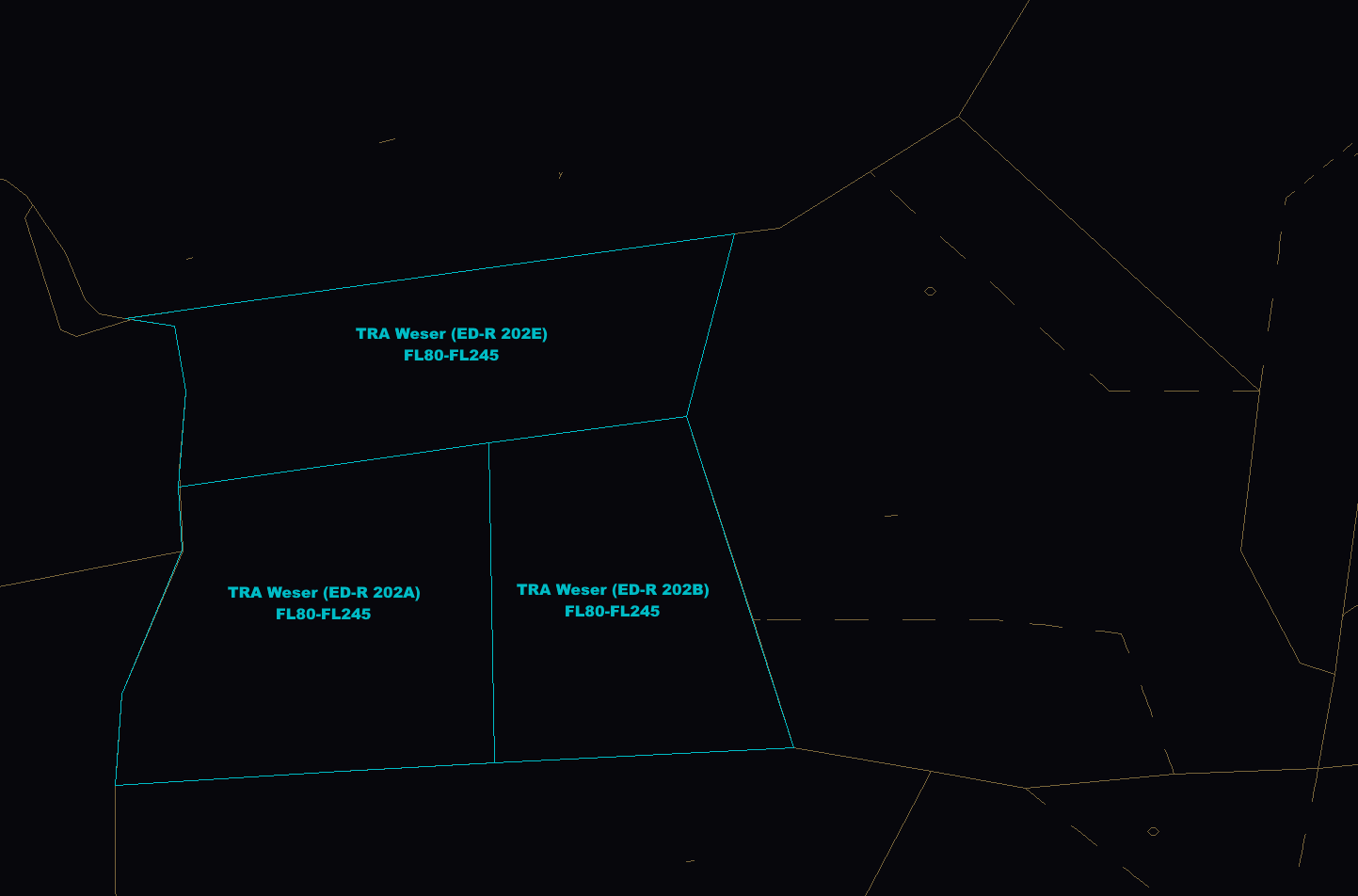EDDW Arrival
Sectorization and Airspace
Sector Friesland
Sector Friesland is part of EDWW sectorgroup Nord-B (EBG Nord-B).
| Station |
Station ID |
Frequency |
Login |
| Friesland |
FRI | 124.800 |
EDDW_APP |
POBZU Area
During non-usage of ED-R 202 E, sector FRI delegates ATS within the POBZU area from FL195 to FL245 to sector ALR. This is to enable sector ALR better descents for EDDH inbound traffic. Sector FRI shall inform sector ALR when the delegation needs to be terminated due to the usage of ED-R 202E.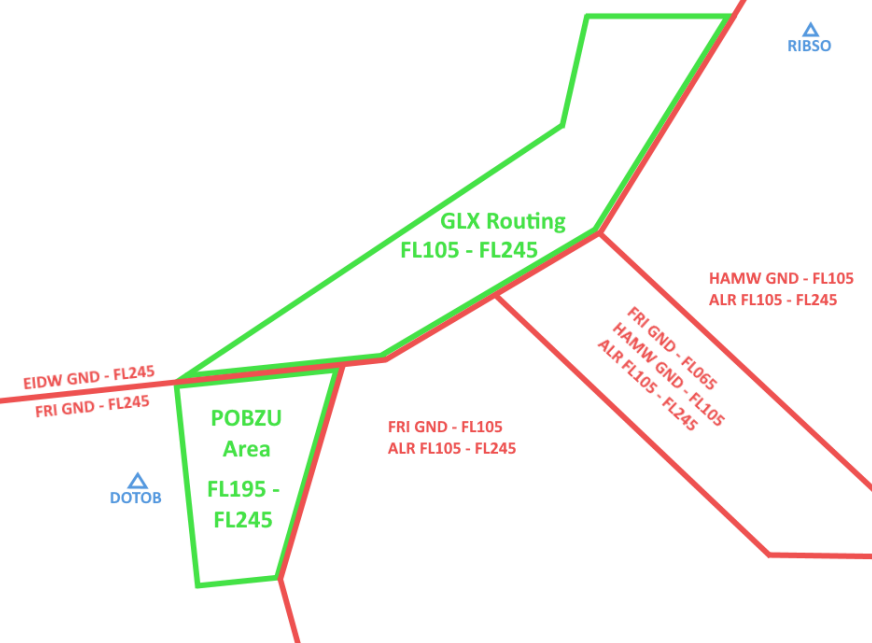
Airspace
Bremen airport is surrounded by a class D (non-CTR) airspace up to FL65 (see picture). Below a class E airspace has been established reaching down to 1000 ft AGL. Above FL65 a Transponder Mandatory Zone (TMZ) exists up to FL100. VFR traffic is allowed to cross the TMZ without ATC clearance. Pilots must monitor frequency 124.800 (no initial call required) and squawk 4471. The squawk will indicate that the pilot crossing the TMZ is on the frequency. ATC may issue traffic information about arriving and departing IFR traffic when required.
Arriving IFR traffic to EDDW will usually descend outside protected airspace. ATC shall provide traffic information about VFR traffic whenever possible.
Military AoRs
Wittmund AoR (ETNT_APP) and Nordholz AoR (ETMN_APP) may be active. Parts of those military AoRs are within sector Friesland. When active, airspace within the AoRs will be delegated from sector FRI from GND to 5500 ft. Every movement between a military AoR and sector FRI is subject to individual coordination. Wittmund Radar and Nordholz Radar shall inform sector Friesland about the opening and closure of the military AoRs.
Sector Friesland will not provide top-down service. This is the task of the EDWW sector EIDW.
TRA Weser
Within the western part of sector FRI (GND-FL245), the TRA Weser may be active from FL80-FL245. Traffic is generally not approved to cross ED-R 202A and ED-R 202B. ED-R 202E may be crossed if the traffic is proceeding on one of the following airways: N125, Y200, M105 and T968. All TRA priority airways can be displayed in the EDWW Euroscope Package (MIL MAPS).
Additionally, ED-R 302 (whole TRA) or ED-R 302B (sub-sector) may be active above FL245.
Sector FRI shall inform Bremen Ground/Tower about the activity of TRA Weser. During the activity of ED-R 202A, 202B, 202E, 302B or 302 all SOFED departures shall not be used. Traffic shall be routed via OTEXE N125 SOFED instead.
Arriving Traffic to EDDW
Managing inbound traffic
Traffic inbound to EDDW will be transferred descending to FL110 from EDWW and descending to FL250 from EDYY. The published STARs are not used. The clearance limits are VERED, PIXUR, EKROV and GIBMA. For further descents, sector FRI shall pay close attention to sectors HAME/HAMW and HAN to avoid uncoordinated sector entries.
EDYY sector JEV is responsible for separation to outbound traffic on airway N125. For separation purposes, EDYY sector JEV may request a lower level from EDWW sector FRI.
Usually, sector Friesland will use vectors to sequence traffic into EDDW. Alternatively, early directs onto the transition (e.g. DW555) can be coordinated with the surrounding sectors.
Due to the limited airspace available, sector Friesland may vector aircraft from the south to the northern downwind and vice versa, to generate extra track miles during periods of high traffic. Alternatively, the published transitions may be used to relieve the frequency. During 09-Ops either VERED09B (south downwind) or VERED09A (north downwind) can be used.
Approach Types
There are different published approach types available at EDDW. By default, the ILS Z approach will be used. All other approach types are on the pilot's request only.
| Runway |
Available Approach Types | Intercept Altitude |
|
09/27 |
ILS Z, LOC Z, RNP, VOR | 3000 ft |
| ILS Y | 1700 ft (as published) |
The ILS Z and ILS Y are approved for CAT III operations.
Target Spacing
The following target spacings shall be used between aircraft on the same final, except if wake turbulence separation is higher:
| Conditions |
Target Spacing |
| Normal Operations | 6 NM (*) |
| After coordination with Tower | 3 NM |
| During Low Visibility Conditions | 10 NM |
(*) Behind a Beluga XL (A337) landing on runway 27, Bremen Radar shall increase the target spacing as a backtrack is required to vacate the runway via taxiway C due to wing span limitation. The normal Beluga (A3ST) is not affected from this.
Departing Traffic from EDDW
Departing traffic from EDDW shall switch automatically frequency from Tower to EDWW. Traffic via BASUM, ERLAD, NIE, GESTO and WSN shall be transferred to EDWW ACC sectors according to LOP EDWW para 3.9.3. Traffic via SOFED or OTEXE with an RFL above FL245 shall be transferred to EDYY UAC sector JEV according to LoA EDWW-EDYY para 3.5.1. Traffic via SOFED or OTEXE with an RFL below FL245 shall be transferred to EHAA ACC.
Often traffic may be coordinated on a higher flight level with sector ALR or EMS to avoid unnecessary level-offs.
When workload permits, sector ALR shall offer sector FRI to issue a higher level than FL100. In this case,
sector FRI is responsible for keeping aircraft clear of HAME/HAMW.
When coordinating a higher flight level with sector EMS for flights with ADEP EDDW via ERLAD, NIE and BASUM, sector FRI is responsible for separation to sector ALR. Sector EMS is responsible for separation to sector HAN.
VFR Traffic
VFR Departures
Jet aircraft or any aircraft with an MTOM of more than 5700 kg shall follow a published IFR departure route under VFR conditions.
By default, the Bremen Tower will instruct the aircraft to stay clear of airspace class D (non-CTR). Nevertheless, coordination may be required between Bremen Tower and Bremen Radar in case the pilots request further climb. In this case, Bremen Radar shall issue the approval to enter airspace D (non-CTR) to Bremen Tower directly.
VFR Arrivals
Jet aircraft or any aircraft with an MTOM of more than 5700 kg shall follow published IFR arrival routes under VFR conditions.
In this case, the arriving VFR traffic shall contact Bremen Radar latest 25 NM before approaching EDDW. Bremen Radar shall provide service for a practice approach VFR (e.g. via an ILS approach). An entry via published VFR arrival routes into the CTR is not possible.
Enroute Traffic
Due to the sector partially reaching up to FL245, en-route traffic may be expected. Primarily, traffic will fly from west to east (airway M105) or from east to west (airway N125).
For traffic via EEL to the EHAA FIR, sector Friesland shall generally use the following flight levels: FL240, FL200, FL160, FL120 and FL80. Any deviation from this shall be coordinated with the station responsible for EDWW sector EIDW.
Emden (EDWE) and Wilhelmshaven (EDWI)
When online, Wittmund Radar will provide ATC service for traffic from/to Emden and Wilhelmshaven. If Wittmund Radar is offline, the station responsible for EIDW will take over all duties.
In general, inbound traffic shall be transferred to Wittmund Radar at an altitude of 5000 ft. An early handoff is required, so Wittmund Radar has enough time to clear the approach.
Departing traffic from EDWE, EDWI will be transferred to sector FRI at either 4000 ft or 5000 ft. For traffic out of EDWE, EDWI and EDWF via EDWW sector ALR, Friesland shall coordinate the transfer level individually.
Groningen (EHGG)
It is possible, that IFR traffic will approach EHGG via sector Friesland. Inbound traffic shall be transferred inbound DOBAK at FL70 to EHGG APP. Outbound traffic from EHGG via DOBAK will be cleared to FL60 from EHGG APP.

